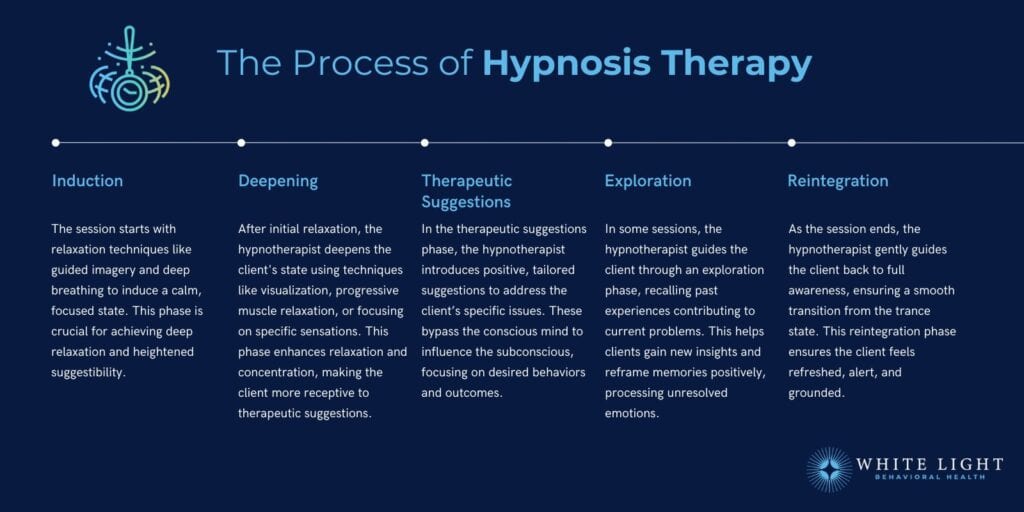Hypnotherapy: A Proven Course to Quit Cigarette Smoking completely
Hypnotherapy has actually become a fascinating method for those looking for to break without the restraints of cigarette smoking addiction. By targeting the subconscious mind, this restorative technique not only addresses the physical dependence on nicotine but also unravels the psychological triggers that bolster the habit. Research study shows that hypnosis can substantially improve the chance of effective cessation. As we discover the concepts and efficiency of this strategy, it becomes important to consider what people can anticipate throughout their sessions and exactly how this modality can match conventional methods in fostering long-term modification.
Recognizing Hypnosis
Hypnosis, as a restorative method, leverages the power of focused focus and enhanced suggestibility to assist in positive behavior changes. hypnotherapist. This method entails assisting individuals right into a trance-like state, identified by deep leisure and concentration, which permits increased understanding to suggestions. The process is not concerning shedding control, however rather enhancing the individual's ability to access their subconscious mind, where many practices and habits are rooted
During a hypnosis session, an experienced professional utilizes verbal hints and images to aid customers envision their objectives, instilling favorable affirmations and way of living modifications. This technique is based in psychological concepts, attracting on the understanding that the subconscious mind can affect actions and ideas a lot more exceptionally than mindful thought alone.
Hypnosis is commonly used to deal with various issues such as anxiety, anxiety, and phobias, in enhancement to smoking cigarettes cessation. As a complementary method to traditional therapies, hypnotherapy provides a special pathway for those looking for long lasting change and self-improvement (hypnotherapy for smoking cession).
How Hypnosis Assists Smokers
:max_bytes(150000):strip_icc()/positive-blonde-middle-aged-woman-psychologist-talking-to-girl-patient-1213531990-745e910347594bf0a0569e7e1b908105.jpg)
During sessions, a trained hypnotherapist guides the smoker to discover the origin of their dependency, helping them to recognize and change the negative thought patterns that strengthen their wish for nicotine. This process can substantially diminish cravings and minimize the psychological responses associated with cigarette smoking.
In addition, hypnotherapy can enhance the smoker's self-efficacy, encouraging them to picture a smoke-free way of life and reinforcing their commitment to give up. The strategy commonly integrates positive tips that urge much healthier behaviors and dealing mechanisms, further consolidating the need to remain smoke-free.
Eventually, hypnosis addresses both the emotional and behavior facets of smoking cigarettes cessation, making it an extensive device for those looking for to break devoid of tobacco dependancy. By fostering a deeper understanding of individual triggers, individuals can efficiently navigate their trip toward a healthier, smoke-free life.
Research Study and Success Rates
Numerous studies have actually checked out the efficiency of hypnotherapy as a technique for smoking cigarettes cessation, exposing appealing success prices. Study shows that hypnosis can considerably improve an individual's likelihood of stopping compared to traditional cessation techniques. A meta-analysis of different researches reported that around 20% to 30% of individuals preserved abstaining from cigarette smoking for at the very least six months after undergoing hypnotherapy, a noteworthy boost compared to the 5% to 10% success price common of other interventions such as nicotine substitute therapies.
In addition, a study released in the Journal of Clinical Psychology located that hypnosis not only help in quitting but likewise addresses the psychological facets of dependency. Individuals that underwent hypnosis reported lower yearnings and a reduced wish to smoke long after therapy.
In addition, some research studies recommend that the mix of hypnotherapy with cognitive-behavioral methods may generate even greater success rates. While specific end results can vary, the growing body of evidence supports hypnotherapy as a sensible and reliable option for those seeking to stop smoking cigarettes, making it an important factor to consider for individuals having a hard time with pure nicotine addiction.
What to Anticipate in Sessions
Throughout a common hypnosis session for smoking cessation, clients can anticipate an organized yet individualized approach designed to resolve their specific requirements and challenges. The session typically starts with an initial assessment, where the therapist collects information regarding the customer's smoking cigarettes background, causes, and motivations for stopping. This foundational understanding permits the specialist to tailor the session successfully.
Once the groundwork is laid, the customer is assisted right into a kicked back state of hypnosis, which promotes increased focus and understanding - hypnotherapist. In this state, the specialist utilizes numerous techniques, such as positive affirmations and visualization, aiming to reframe the customer's relationship with cigarette smoking. For example, the specialist may aid the customer picture a life free from cigarettes, strengthening the benefits of giving up.

Extra Support Approaches
To enhance the efficiency of hypnotherapy for cigarette smoking cessation, individuals can integrate additional support strategies that enhance their commitment to giving up. Engaging family members and good friends that comprehend the challenges of giving up can offer the required support and liability.
Mindfulness techniques, such as reflection and deep-breathing exercises, can additionally be helpful. These methods help lower and take care of food cravings anxiety, which is commonly a trigger her comment is here for cigarette smoking. Maintaining a journal to track progression, thoughts, and sensations can give understandings and reinforce inspiration.

One more efficient method is to make use of digital devices, such as cigarette smoking cessation applications, which offer resources, pointers, and inspirational messages. It's additionally prudent to educate oneself regarding the health benefits of stopping and the threats of smoking cigarettes, as this understanding can strengthen check out here one's resolve.
Conclusion
In verdict, hypnosis offers a sensible and efficient choice for people seeking to give up cigarette smoking. Ultimately, hypnosis contributes considerably to the broader landscape of smoking cessation methods.
Hypnotherapy is often used to resolve different concerns such as stress and anxiety, tension, and anxieties, in addition to smoking cessation.Many researches have examined the performance of hypnosis as an approach for smoking cessation, revealing encouraging success rates.During a regular hypnotherapy session for smoking cigarettes cessation, customers can expect a structured yet individualized approach made to address their certain needs and challenges.To improve the performance of hypnosis for smoking cigarettes cessation, individuals can integrate extra support strategies that strengthen their dedication to quitting.In conclusion, hypnotherapy presents a reliable and sensible alternative for people seeking to stop smoking.